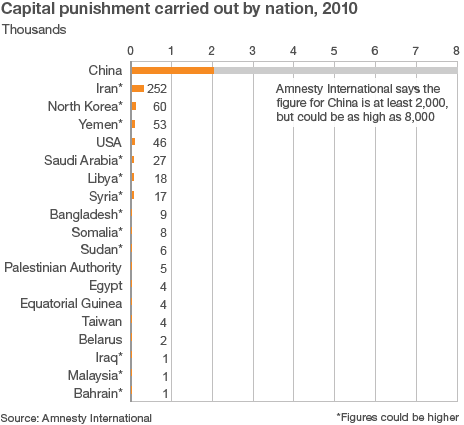Death Penalty: US vs. The World
Amnesty International is drawing attention to capital punishment in the United States, with bad math and a credulous media on its side.
Amnesty International is drawing attention to capital punishment in the United States, with bad math and a credulous media on its side.
BBC (“Amnesty International: Global death penalty trend fall“):
Although 23 countries carried out executions in 2010, four more than in 2009, the number of people executed dropped from at least 714 to at least 527, the rights group said.
But that figure does not include China, whose executions are thought to be more than all other countries put together.
Gabon last year became the 139th country to cease the practice.
Mongolia declared a moratorium on the death penalty.
[…]
Amnesty secretary general Salil Shetty said: “In spite of some setbacks, developments in 2010 brought us closer to global abolition.”
But he added: “The minority of states that continue to systematically use the death penalty were responsible for thousands of executions in 2010, defying the global anti-death penalty trend.”
Andrew Sullivan approvingly links a FrumForum post by Michael P. Stafford which is no longer at the site:
From 1976 to today, more than 1200 offenders have been put to death in the United States. During this same period, almost 140 convicts on death row have been exonerated of their crimes. These figures are troubling. The number of individuals on death row that have been exonerated is almost 12% of the total number of offenders executed. As George Will noted in 2000, capital punishment in America “is a catalog of appalling miscarriages of justice, some of them nearly lethal. Their cumulative weight compels the conclusion that many innocent people are in prison, and innocent people have been executed.”
All three use the chart atop the post, which I gather was crafted by BBC using Amnesty report figures. Now, I happen to agree with George Will (and presumably Sullivan and Stafford) that the way the United States conducts its capital punishment regime is troubling. But the chart is dubious, to say the least.
First, the numbers are regime-provided figures for state executions. Of the listed countries, I trust precisely one–mine–to provide anything close to legitimate data. So, we’re comparing the full numbers for the United States with doubtless suppressed numbers from everyone else on the chart.
Second, raw numbers are absurd. China has 1.3 billion people and the United States some 310 million. Iran has something like 73 million, North Korea something like 24 million, and so forth. A non-propagandistic portrayal, then, would base the figures on a per-100,000 or other proportional basis.
Third–and most important–one of the points of these discussions is to spotlight how horrible the company is that we’re keeping. It’s the United States and some of the worst dictatorships on the planet!
But there’s a rather important difference in how our governments go about deciding who to put to death. Here, our worst criminals are tried by a jury of their peers, sentenced to death almost exclusively upon the recommendation of said peers, and executed only after an exhaustive set of appeals that span more than a decade. In most of the other countries on the list, government officials decide on their own authority who to kill–often for no greater crime than speaking out against said officials.






I certainly agree as regards the chart.
But let’s talk about how we try and prosecute.
In this country police are motivated to close cases, not to pursue the ultimate truth. In this country prosecutors are politicians and since they are rewarded for putting bad guys to death they move heaven and earth to do so.
The accused are jailed. Those that are poor are effectively denied bail, and then denied competent legal counsel. The state has effectively limitless resources while the accused may have a part-time defense counsel with no experience or investigative resources.
In other words, we stack the deck. Not the way Iran does, but still, we stack the deck.
Our appeals process refuses to look at questions of actual guilt, focusing instead on narrow matters of procedure. So again, the goal is not truth, but conviction and execution.
It’s a lousy, corrupt and utterly unnecessary system kept in place for purely political reasons.
The result is that we
Michael,
I agree all those problems exist with the system. They exist for non-capital cases, too, of course but there is at least the glimmer of hope of correcting wrongs if we don’t kill our mistakes.
I’m not sure how to fix some of this. The overwhelming number of capital convicts are actually guilty of their crimes and it would be absurd to allow them to constantly demand re-trial on the facts. (Especially since, again, the same flaws exist in the rest of the system.) But there has to be an exception carved out for egregious error, with the burden of proof placed on the convict, not the state.
And then, Michael, after all of that – the poor underrepresented person still has to be found guilty beyond a shadow of a doubt by 12 of his peers. Heck, the case is sometimes even moved to a different court location to ensure a more favorable jury of his peers. That deck is stacked greatly in favor of the defendant. It’s certainly not a perfect system, but to even discuss this in a comparative fashion is pretty inflammatory.
Michael,
If you haven’t heard it, take an hour or so and listen to the This American Life episode number 282:
http://www.thisamericanlife.org/radio-archives/episode/282/DIY
Even after the real killer in a murder case came forward and proved unequivocally that he was the only person involved with the murder, an innocent man spent 20 years in jail because he had been declared “guilty.”
There’s another element — the US total is actually 51 (at least) legal systems at work. Thanks to our federalism system, a lot of executions are carried out by the several states, with virtually no national involvement.
Just as a data point, I wonder how Texas would rank if it was listed alone…
J.
Huh?
Yes, there are significant differences between the US and other nations on this list. And yes, those differences are unfairly suppressed in the presentation.
But there is a very huge and very significant similarity between the US and all of the nations on the list – and none of the nations not on the list. We execute people.
You could dispense with all the numbers on the chart, and just focus on the names on the list.
Second, raw numbers are absurd.
Not if you’re thinking about how many innocent people (or those who commit what we would consider less than capital crimes) may have been murdered by the state, they’re not.
A non-propagandistic portrayal, then, would base the figures on a per-100,000 or other proportional basis.
Focusing on possible state murders of innocent people is not propagandistic. It’s the point of the study.
In most of the other countries on the list, government officials decide on their own authority who to kill–often for no greater crime than speaking out against said officials.
That’s only if you want to compare our procedures to theirs. Many of us are simply asking why our government still perform executions at all, regardless of how the executed are convicted. Capital punishment is barbaric and part of a flawed judicial system that cannot guarantee the state does not kill innocent citizens. It should end.
But hey, if you like the company you keep, that of countries determined to live in the culture of centuries past, what’s a few dead innocents here and there?
That deck is stacked greatly in favor of the defendant.
Only rich defendants, chuckles. The idea that our judicial system is fair to poor folks is laughably absurd.
I wonder how they get their numbers for Somalia. Since the ‘national’ government is confined to Baidoa and a few spots within Mogadishu, if they really have executed 8 people, then that number is HUGE compared to the population that is under their rule. If they are including Puntland and Somaliland, then they are including two independent governments that are not really answerable to the TFG.
In short, including Somalia on any study makes me doubtful of the efficacy of that study.
Its irrelevant whether other countries do it or not, let alone what we think of the countries that do or don’t. The only relevant question is whether it is a good policy at home.
I’d argue it clearly isn’t, if only because of the significant chance of executing an innocent person. But whether they have executions in China or Iran makes no difference to me … if “good” countries like say Japan or the UK had executions, it still wouldn’t change the local argument.
Have we killed an innocent person?
Answer “Yea” or “Nay” and then STFUP.
and George, I wasn’t picking on you. I agree with you… x2….
@Joyner
Are they?
In July, 2010 Japan executed two people. Why are they not part of the graph?
“The two male convicts hanged were Kazuo Shinozawa, 59, who killed six people by setting fire to a jewellery store, and Hidenori Ogata, 33, convicted of killing a man and a woman and seriously injuring two others.”
Yawn, anybody got any new light to shed on this?
No Charles, innocent people still sit on death row, and you still don’t care. Nothing new here…
For the most part, this discussion was pretty well explored on this thread: https://www.outsidethebeltway.com/illinois-abolishes-death-penalty/
Again, I do find it somewhat ironic that most of the people here who most strongly support the death penalty seem to be the ones who typically think that government can’t do anything right. If they believe the government is half as incompetent as they say, I have a difficult time understanding why they would want it pointing a gun at them.
Which get’s me to David’s quote:
Clearly David has never been involved in the criminals courts, especially in more conservative areas of the US. A close associate is involved in the Federal Courts, and in particular Habeas Corpus law. Having seen that amount of power that prosecutors have, and further the high level of violation that, under the current law, is required to overturn a ruling, it’s impossible for me to take that postion seriously.
tom p, not at all, I care a great deal, just about a different set of ideals. But I defy you to find anything in any previous comments that says I want innocent people to die or that I am even indifferent to it. I just don’t share your solution. Sorry if that makes me a bad person.
FWIW, I’m referring to the same old tired arguments and pissing matches. Sorry it was necessary to spell that out. Can’t dare expect goodwill I suppose.
@Charles
And as I said in the last thread, the system that you articulated, as I understand it, cannot work in the “real world” (i.e. the shared reality that we both exist within). And even if it could, it isn’t the system(s) as exists today with the US.
So my question to you is: do you support the death penalty(ies?) as it is applied today within US states.
It’s a yes/no. There is no qualification. And saying that you support a “better system” is answering a different question.
If you answer “yes” (that you supprt the current status quo), I respect that. But I will remind you that it also means you are supporting a system that continues to execute people for crimes that they did not commit. There is no way around that.
I never said that you liked or wanted it to happen.
But. supporting the current death penalties means that you believe that social benefit of killing criminals is worth the occasional wrongful execution continuing to happen.
Personally, I cannot support that current system because of that reason. That’s why I’m for life in prison without parole, but not the death penalty.
T]he poor underrepresented person still has to be found guilty beyond a shadow of a doubt by 12 of his peers. ….
Reasonable doubt, not “shadow of a doubt”. Properly instructed, a jury knows that not any defence will do, not any far-fetched doubt, just one which creates a doubt which is reasonable.
As for juries, I’ve seen juries convict because the accused didn’t make eye contact, according to after-verdict interviews.
The state simply should not be in the business of executing its citizens.
I have never really understood the support of most American conservatives for capital punishment. They won’t trust the government to regulate polluters, or distribute food stamps, but are eager to grant it the power of life and death.
Have to admit that one always amazes me too. If you can’t trust the gov’t in small things like regulation, how in the world can you trust it with a huge thing like taking away a person’s life? There’s an incredible inconsistency there, and puts the lie to their claim they don’t trust the gov’t, or that they want to keep the gov’t out of the lives of people.
mattb, You have proposed a false question meant to trap. The question isn’t “do you support the death penalty(ies?) as it is applied today within US states?” but rather is the only solution to the problems with the administration of the death penalty it’s abolition? That is what I take issue with. I freeely acknowledge there are problems with the administration of the death penalty, but as I have noted many times previously, the perfect is the enemy of the good, and if you are going to demand perfection, why stop with the death penalty? How about eliminating all government programs that aren’t perfect?
george, et al, conversely, you freely admit the government isn’t all seeing and all knowing and yet constantly seem to want to give it ever more authority over our lives. You can’t have it both ways you know, no matter how much you want it.
The price of a human life has become worthless since the beginning of the war on drugs. Humans will always kill, but the government should not be in that game. I am conservative, yet recently changed my mind on the issue of capital punishment, primarily because of my belief that the government should not kill its own citizens, but also because of the innocent mn who get wrongly convicted.
The point of this post was not to once again argue about whether the death penalty is right or wrong. The point is that the chart is nasty, heavily distorted propaganda, that trustingly relies on figures supplied by oppressive regimes and makes no distinction between nations that have jury trials, appeals, and independent defense counsel, and nations where if a government apparatchik doesn’t like the way you look at him you get a bullet in the back of the head. Yes, yes, there are plenty of problems with the US system and it’s a perfectly valid argument that we should stop the death penalty altogether, but do you guys really see no difference between America’s system and the ones in use in China, or Iran? Really? Really?
@Charles…
Good god! Really?! I don’t know how tor read this except that in the name of “good” and “slippery slopes” you support the continued execution of people who were not guilty of the crime they committed.
Now, backing up, you wrote
No, what I actually did was propose the first of four questions (of which yours is a later step). Let me do the flow chart:
Q1 – Do you support the death penalty(ies?) as it is applied today within US states?
Your answer: “I freeely acknowledge there are problems with the administration of the death penalty” – as far as I can tell, that’s a “no.”
Q1 leads to three other immediate questions in my mind. One as you suggest is: (Q2) “If not, how might it be fixed?”
But a critical other one is (Q3) – What do we do in the meantime while we are fixing it? If your answer is that we should continue with business as usual (executing people and putting more people on death row) while we work to refine things, then you are supporting the state killing of people who are wrongfully convicted. (or, here’s a challenge, find a flaw in my logic)
The final question, (Q4) btw, if you think the system is flawed, what are you doing to change the system? Because if you are saying that the system should be changed[*] but not taking any action, then, quite frankly see my point above.
Again, Charles, we can respectfully disagree on a lot of stuff. And I respect your view that there is a way to make a better system. But you do have a bit of a habit of making claims without accepting the moral implications that go along with them.
Simply put, any continuation of the current systems as is will result in the ongoing execution of people who were not guilty of the crime they committed.
[*] – I financially contribute to organizations doing anti-death penalty and innocence work. When I’ve lived in death penalty states in the past, I also partook in letter writing campaigns.
do you guys really see no difference between America’s system and the ones in use in China, or Iran? Really? Really?
Is anyone saying that? Really? Really?
“I am not sure how to fix it?” You are kidding-right? Abolition. White peers convicting black defendants is the most common death penalty scenario- hardly a jury of “your peers.”
Cklarifiaction: David says:
<>
The standard is not that high. It’s actually beyond a reasonable doubt which is a much, much lower standard for conviction.
Furthermore, 138 people have been exonerated in the US since the “modern-day” death penalty was reinstated. Most experts agree that TX has executed at least one innocent person, Cameron Todd Willingham. Many believe that there are three more.